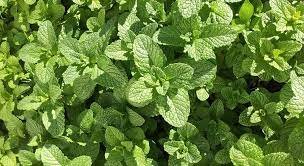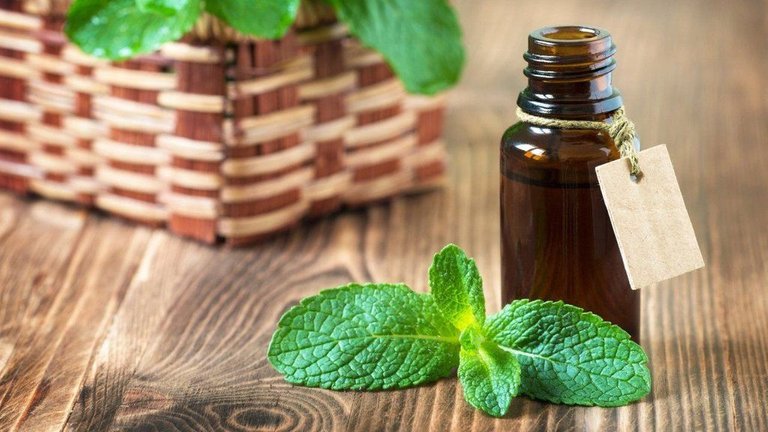Many people turn to it as a dressing to add freshness and intensity to their dishes. However, it is much more than that, as it has countless nutritional properties
Mint, whose scientific name is Mentha piperita L, is a very popular plant whose main characteristic is the sensation of freshness that it provokes on the palate with its consumption and to which the food industry has resorted since time immemorial. Chewing gum, candies, cocktails, ice creams, oils, sweets, sauces ... Over the years, mint has become one of the most special garnishes, which currently has two dozen species and hundreds of varieties to choose from, such as, for example, the also famous peppermint or pennyroyal, very popular in the field of infusions.

However, peppermint is not just a unique source of flavor, it also has a multitude of nutritional benefits. In fact, in the past, it was used for medicinal purposes, especially in regard to digestive and respiratory diseases. Peppermint has anti-inflammatory, expectorant, antiseptic, analgesic, antibacterial or antitussive properties, among others, as the list is much more extensive.
- Health benefits of peppermint leaves
Peppermint leaves are especially helpful in alleviating digestive disorders. Without going any further, the infusions of this plant help with the heaviest digestions. In addition, it is a 100% natural remedy that reduces abdominal bloating caused by gas and flatulence. It also reduces intestinal irritation, typical of conditions such as colitis or Crohn's disease, and prevents vomiting and abdominal cramps. And finally, its aroma activates the salivary glands of the mouth and those that secrete digestive enzymes. Given this compendium of properties, mint infusions are ideal for after eating.

The respiratory system is also rewarded with its consumption. Menthol decongests the airways and alleviates common conditions such as asthma or common colds. It also fights against irritation caused by chronic coughs, thanks to its cooling effect that cools and soothes the throat, nose and the rest of the respiratory channels.

On the other hand, peppermint oil is a good antipruritic, which serves to relieve itching, and antiseptic, great allies of the health of our skin. This plant helps to heal infections, mitigate the symptoms of acne and soothe eczema, dermatitis and hives; in addition to acting as a complement to treatments against insect bites, irritation or swelling.

It is used for medicinal purposes, especially in digestive and respiratory diseases
Peppermint includes rosmarinic acid and eugenol in its composition, two substances with anticoagulant effects that improve blood oxygenation.
Its antiseptic properties also act against bad breath, making it one of the essential ingredients for any oral health product. In addition, it helps to eliminate the bacteria that cause the bad smell and to prevent diseases such as cavities or gingivitis.
Also, peppermint is an antifungal product, so many people turn to it as a plaster or essential oil to eliminate fungus from nails and skin.

A study published in 2003 suggested that consuming peppermint leaves helped activate digestive enzymes that absorb nutrients from food and convert fat into usable energy. For this reason, it is a plant that is usually part of the diet of those who want to lose or control weight.
Among the benefits of mint, its analgesic capacity also stands out, a very interesting remedy against headaches, especially migraines. In fact, some experts recommend applying peppermint essential oil to the temples and forehead to reduce the symptoms of the disease, such as intolerance to light or noise and nausea.
Despite all these benefits, it is not recommended to abuse mint in cases of hiatal hernia, heartburn or digestive ulcer, since the menthol that characterizes it can worsen the symptoms. Especially if it is used as an essential oil, hence the importance of diluting it properly before use. Due to its stimulating properties, some people may experience side effects such as gastritis, allergies, or episodes of insomnia and nervousness.
Spanish Version
Muchas personas recurren a ella como aderezo para dar frescura e intensidad a sus platos. Sin embargo, es mucho más que eso, pues posee infinidad de propiedades nutricionales
La menta, cuyo nombre científico es Mentha piperita L, es una planta muy popular cuya principal característica es la sensación de frescura que provoca en el paladar con su consumo y a la que la industria alimentaria ha recurrido desde tiempos inmemoriales. Chicles, caramelos, cócteles, helados, aceites, dulces, salsas… La menta se ha convertido con el paso de los años en uno de los aderezos más especiales, que cuenta actualmente con dos docenas de especies y cientos de variedades entre las que elegir, como, por ejemplo, la también célebre hierbabuena o el poleo, muy popular en el ámbito de las infusiones.

Sin embargo, la menta no es solo una fuente única de sabor, también posee multitud de beneficios nutricionales. De hecho, en el pasado, se empleaba con fines medicinales, sobre todo en lo que a enfermedades digestivas y respiratorias se refiere. La menta tiene propiedades antiinflamatorias, expectorantes, antisépticas, analgésicas, antibacterianas o antitusivas, entre otras, pues la lista es mucho más extensa.
-Beneficios para la salud de las hojas de menta
Las hojas de menta son especialmente útiles para aliviar los trastornos digestivos. Sin ir más lejos, las infusiones de dicha planta ayudan con las digestiones más pesadas. Además, se trata de un remedio 100% natural que reduce la hinchazón abdominal provocada por los gases y las flatulencias. También reduce la irritación intestinal, propia de afecciones como la colitis o la enfermedad de Crohn, y evita los vómitos y los cólicos abdominales. Y, por último, su aroma activa las glándulas salivales de la boca y aquellas que segregan las enzimas digestivas. Ante este compendio de propiedades, las infusiones de menta son ideales para después de comer.

El sistema respiratorio también se ve recompensado con su consumo. El mentol descongestiona las vías respiratorias y alivia trastornos tan frecuentes como el asma o los resfriados comunes. También lucha contra la irritación que causa la tos crónica, gracias a su efecto refrescante que enfría y calma la garganta, la nariz y el resto de canales respiratorios.

Por otro lado, el aceite de menta es un buen antipruriginoso, que sirve para aliviar la picazón, y antiséptico, grandes aliados de la salud de nuestra piel. Esta planta ayuda a curar las infecciones, mitigar los síntomas propios del acné y aplacar los eczemas, la dermatitis y la urticaria; además de actuar como complemento de los tratamientos contra las picaduras de insectos, la irritación o la hinchazón.

Se emplea con fines medicinales, sobre todo en enfermedades digestivas y respiratorias
La menta incluye ácido rosmarínico y eugenol en su composición, dos sustancias con efectos anticoagulantes que mejoran la oxigenación de la sangre.
Sus propiedades antisépticas también actúan contra el mal aliento, convirtiéndose en uno de los ingredientes indispensables para cualquier producto de salud bucal. Además, ayuda a eliminar las bacterias que originan el mal olor y a prevenir enfermedades como las caries o la gingivitis.
Asimismo, la menta es un producto antifúngico, por lo que muchas personas recurren a él a modo de emplaste o aceite esencial para eliminar los hongos de las uñas y la piel.

Un estudio publicado en el año 2003 sugirió que el consumo de hojas de menta ayudaba a activar las enzimas digestivas que absorben los nutrientes de los alimentos y convierten la grasa en energía utilizable. Por este motivo, es una planta que suele formar parte de la dieta de aquellos que quieren perder o controlar el peso.
Entre los beneficios de la menta también destaca su capacidad analgésica, un remedio muy interesante contra los dolores de cabeza, en especial las migrañas. De hecho, algunos expertos recomiendan aplicar aceite esencial de menta en las sienes y la frente para reducir los síntomas propios de la enfermedad, como la intolerancia a la luz o el ruido y las náuseas.
A pesar de todos estos beneficios, no se recomienda abusar de la menta en casos de hernia de hiato, acidez estomacal o úlcera digestiva, ya que el mentol que le caracteriza puede empeorar la sintomatología. Sobre todo si se utiliza como aceite esencial, de ahí la importancia de diluirlo adecuadamente antes de su uso. Debido a sus propiedades estimulantes, algunas personas pueden experimentar efectos secundarios como gastritis, alergias o episodios de insomnio y nerviosismo.
Thank you very much for reading my post, I hope you like it and I would appreciate your support, greetings
####Muchas gracias por leer mi post, espero que sea de su agrado y agradecería su apoyo, saludos
Looks like I am paying a visit to the local flower shop. I need that antifungal for me my feet. I didn't know about that. then I checked the web for a bit more info and got even more motivated. Thanks for sharing. I'll be planting some of this too. already had it planned but the antifungal thing got my attention even more.
I am very happy that my post has been very helpful to you. And I hope you can get what you need. Thanks again for visiting my post @fractaldreams
wasnt aware of all these helpful benefits from mint alone, and here i thought they only made nice smelling drinks 😅 thank you for sharing this article!

https://d.buzz
As the title of my post says, there are so many of us that today we are still unaware of the multiple benefits of mint. Thank you very much for visiting my post @ilovewintergem
Source of plagiarism
Plagiarism is the copying & pasting of others' work without giving credit to the original author or artist. Plagiarized posts are considered fraud and violate the intellectual property rights of the original creator.
Fraud is discouraged by the community and may result in the account being Blacklisted.